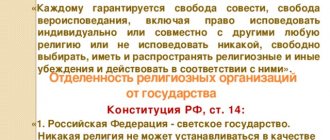The right of a Russian citizen to freedom to profess any religion is determined by law 125-FZ. This document guarantees the opportunity to perform religious rites, conduct religious training and education, and promote religious or any other beliefs, including atheism. The law also does not allow coercion to practice or renounce any religion.
Victims of violations of this right are protected by law. Punishment for insulting the feelings of believers is provided for in Art. 148 of the Criminal Code of the Russian Federation. It should be noted that this legal norm was introduced not so long ago, namely in 2013 after a scandalous incident in the Cathedral of Christ the Savior in Moscow involving a punk band. Some participants in this ugly prank were imprisoned for insulting the feelings of believers.
In addition, there is administrative liability for violating the law on freedom of religion. Art. 5.26 of the Administrative Code provides for an administrative fine or forced labor for public desecration or destruction of religious objects and attributes for both individuals and legal entities.
Signs of crimes that offend the feelings of believers
Offenses that cause insult, according to Article 148 of the Criminal Code of the Russian Federation, must meet certain criteria in order to bring the perpetrators to criminal liability:
Additionally
If during the proceedings no sufficient grounds were found to convict the offender for insulting religious feelings, then punishment for related crimes may be applied to him. This can happen in the following cases: an insult to the feelings of a believer, uttered in a temple, but directed at the individual as a whole, without religious overtones; disorderly conduct in a place of worship without religious overtones.
- By virtue of Art. 148 of the Criminal Code criminalizes insulting religious feelings. These are any public actions that are carried out with the intent to insult and reflect open disrespect for society. Such actions may include ridiculing religious norms and canons, or publicly expressing disrespect for a person because of his religious beliefs. Insult can be expressed in a variety of forms: verbal or written, in the form of comments on social networks, posting videos on the Internet with scenes of desecration of holy objects or places for believers, etc.
- Actions must be performed publicly, that is, they must be witnessed by strangers. Everything that happens during a personal conversation or meeting between a believer and his offender does not fall under the scope of this article. Read about public insult and the type of legal liability for it in the article.
- These acts must clearly demonstrate disrespect not only for believers, but also for society as a whole. On this basis, such actions are similar to hooliganism, the punishment for which is established by Art. 213 CC. This article provides for punishment, including for hooligan acts committed on the basis of religious hatred. Responsibility for desecration of buildings committed for the same reasons is determined by Art. 214 CC. For humiliation of human dignity on religious grounds, liability arises in accordance with Art. 282 of the Criminal Code. Since the corpus delicti provided for by these articles is in many ways similar to the acts described in Art. 148, it may seem that a separate article on insulting the feelings of believers is not needed. However, it is aimed specifically at protecting the human right to freedom of religion.
- Another condition for bringing the perpetrator to criminal liability is the clearly offensive nature of his actions. That is, it will be necessary to obtain confirmation that the offense had a specific purpose - to offend religious feelings, and that the perpetrator was aware of his actions. If he can prove that he did not think about the consequences of his actions and committed them unintentionally, then it will be difficult to prosecute him under this article. Find out here how to sue a person for insult.
Legally, the concept of “insult” is defined by Art. 5.61 Code of Administrative Offences. This is a humiliation of the dignity and honor of a person, which is expressed in an indecent form orally, in writing or non-verbally (for example, an indecent gesture or a slap in the face). Responsibility for insulting the honor and dignity of a non-believer or an atheist comes precisely under this article. Until 2011, punishment for insult was provided for by the Criminal Code. Currently, criminal punishment for this offense is established only for a certain circle of persons, for example, judges, government officials (insulting a police officer), believers, and military personnel.
What is a crime?
To answer the question of what kind of insult to faith will be considered criminal, one should refer to the provisions of Art. 14 of Chapter 3 of the Criminal Code of the Russian Federation, which provides the official interpretation of the category “crime”.
The type of offense under consideration has all the characteristics that make it possible to classify it as criminal:
- guilt - an act is punishable only if there is a deliberate mental attitude towards it on the part of the offender;
- public danger - disrespect for the feelings of admirers of shrines poses a significant threat to society and can cause significant harm to protected interests;
- illegality - deviant behavior contradicts generally accepted norms of morality and law;
- Punishability - for damage caused (moral, material, etc.), the sanction of a legal norm provides for punishment corresponding to the severity of the offense and the circumstances of its commission.
The listed characteristic features of a criminal tort make it possible to distinguish it from Art. 5.26 Code of Administrative Offenses of the Russian Federation. In addition, the division of related criminal acts and their difference from administrative offenses is determined by the objective side and other elements of the crime.
Liability under Article 148 of the Criminal Code of the Russian Federation
Other countries
Punishment for insulting religious feelings in other countries can be divided into 3 groups:
- Absence of punishment - in secular states, where the government is completely separated from the church, and freedom of speech is at the forefront (USA, UK);
- Fine or short term - most countries. Depending on the laws of the country, the amount of fines and terms of imprisonment vary;
- Execution is exclusive to some Muslim countries where laws are based on religious beliefs.
- According to this legal norm, insulting religious feelings is punishable by a fine of up to 300 thousand, correctional labor or imprisonment. The term of such punishment is up to one year.
- If such actions were committed in premises for religious ceremonies, the fine increases to 500 thousand rubles, and the term of imprisonment or correctional labor - up to three years.
- The article also provides for punishment for illegal restrictions on the activities of religious organizations and the conduct of rituals in the form of a fine, correctional labor or arrest. If these actions are committed using an official position or using force, the perpetrator is subject to the same punishment, and in addition, is deprived of the right to hold certain positions for a period of up to two years.
The legislation does not provide for the advantage of any religion over others. In Russia there are followers of almost all world religions, and although Law 125-FZ “On Freedom of Conscience and Religious Associations” recognizes the special role of the Orthodox faith, it also talks about respect for all other religions on the part of the state and society. Therefore, regardless of what denomination a believer belongs to, he has the right to defend his religious views and beliefs.
At the same time, by virtue of Part 2 of Art. 3 of Law 125-FZ, only those persons whose religious views do not contradict Russian legislation can file a claim for insult to religious feelings. This means that the religious association to which the believer belongs must be officially registered. If a religious movement has been declared extremist based on a court decision, then its supporters cannot count on the protection of their rights.
The following video contains information about criminal liability for insulting the feelings of believers
Are all religions equal before the law?
Legislation regulating issues of religious organizations and denominations obliges government institutions to distance themselves from the sphere of activity of associations of believers, if its content does not contradict legal guidelines.
This means that in the event of the birth of any new, non-traditional spiritual community, its founders are required to register with the authorities as a religious association. Having gone through the necessary registration procedures, the association is endowed with the same legal status as common beliefs - Christianity, Islam and other directions.
The same legislation prohibits the formation and functioning of associations whose tasks and content of activities contradict the legal basis.
A violation of the law may occur when a religious organization:
- has a destructive impact on the general security of society;
- engages in extremism;
- destroys family values;
- limits the legal status of a person;
- harms moral public principles, people's health, corrupts them, conducts hypnotic sessions and approves of the use of drugs or psychotropic substances;
- promotes suicide or denial of medical care as an ideology of faith;
- limits the participation of a parishioner and his children in compulsory educational programs;
- forces followers to transfer property rights free of charge in favor of third parties or the association itself;
- calls for violation of legal norms and regulations;
- forcibly retains members of the association within its composition.
If a religious community carries out at least one of the above actions, the competent law enforcement agencies will suspend its functioning in court or take measures to liquidate the association as a legal entity.
To summarize, we can say that all religions and their followers have the same rights and bear equal responsibilities as long as they are within the legal framework established by the state.
What actions can be taken to bring to justice
The victim should file a complaint with the police, or better yet, call officers to the scene of the crime. When filing an application, it is advisable to confirm the fact of committing an offense with witness testimony. The statement should describe in detail the actions of the criminal, his appearance, if he is a stranger, and list the victims of this crime. If the police record the fact of an offense, a criminal case is initiated against the perpetrator.
In addition, the victim himself can file a lawsuit against his offender. In this case, you should appeal to the magistrate’s court, since in accordance with Art. 131 of the Code of Criminal Procedure, the magistrate considers criminal cases for which the punishment in the form of imprisonment does not exceed three years. The statement of claim can also be supported by the testimony of witnesses.
If religious feelings are insulted using the Internet and are addressed to a wide range of people, a citizen can write a statement to the prosecutor's office (you can read more about insulting a person on the Internet here). Based on this request, the prosecutor's office will organize a review of the information posted online with the involvement of experts. If experts identify signs of insulting the feelings of believers, the prosecutor will file an application with the court, and this information resource will be blocked based on a court decision.
It is worth noting: if an offender thinks that he can go unpunished by hiding behind a faceless “nickname,” then this is a big mistake. Nowadays they can easily expose anonymous users of social networks and aggressive commentators by calculating their IP address, and then finding out the rest of the information about the user.
Qualifying features
The following are considered qualifying signs of hooligan, indecent actions or actions prohibiting the conduct of religious services:
- In places of worship, during worship.
- Using his official position.
- With the use of violence or the threat of its use.
A striking example of a criminal act can be considered the performance of an obscene dance during a service in the Cathedral of Christ the Savior. In this case, a violation of the conduct of worship was determined in the presence of a large group of believers. The body movements of the dancing women were deliberately obscene.
As a result of criminal actions, the service was stopped, and the parishioners present at it felt insulted .
In other cases, statements and actions are subject to independent examination, which does not allow arbitrariness on the part of religious confessions. Such actions definitely include vandalism against icons and other religious objects.
All religions existing in Russia are equal before the law. However, here it is necessary to keep in mind that a religious group must be legalized (registered) as a religious organization, that is, have official status. Such a rule does not apply to persons who unreasonably refer to their religious beliefs in an attempt to punish an offender.
Judicial precedents under Art. 148 CC
Information on criminal prosecution under this article is difficult to find due to the fact that it is quite difficult to prove all the signs of a crime and especially intent in the actions of the perpetrator. Often the case is reclassified under other articles. Therefore, conviction under Art. 148 of the Criminal Code is quite rare.
Thus, in 2016, a resident of Crimea was convicted of committing drunken acts that offend religious feelings in a place designated for worship. The city court dismissed the criminal case against her, but the prosecutor filed an appeal, and the case was transferred for a new trial. (Appeal resolution of the Supreme Court of the Republic of Crimea dated December 13, 2016 in case No. 22-3631/2016)
Ask questions about the topic of the article and get an answer from an expert
Arbitrage practice
Judicial practice mainly includes cases of vandalism in places of worship, offensive indecent obscene inscriptions addressed to parishioners or those having a general context.
However, a striking example of an insult was the blatant case of an unprecedented action for our culture by the punk group “PussyRiot”, against whose criminal action the entire believing part of society rose up. And the criminals received a prison sentence of 2 years of strict regime.
Punishment for this crime is completely legal and should organize the subjects of society to respect shrines. The notorious case of the satirists of the French magazine Charlie Hebdo shows that in the absence of protection of the views of believers by the state, some of them may decide to act arbitrarily.
You can learn about the amendments made to the law on insulting the feelings of believers by watching the video:
How to file a complaint
A complaint about disrespect for religion must be drawn up in the form of a statement to the police according to the general rules enshrined in Article 141 of the Code of Criminal Procedure of the Russian Federation. The application has the following structure:
- The header indicates the details of the body to which the applicant is applying (full name of the head, position, name of the police department), as well as information about the applicant (full name, residential address, telephone).
- The descriptive part contains a story about the crime in chronological order, what actions were committed and by whom. The details of the criminal, if known, must also be indicated. You should adhere to a restrained style, without emotional descriptions and subjective characteristics. It is also necessary to indicate in this part the persons who witnessed the crime and their contact information.
Important: it is necessary to indicate in the description the time and place where the criminal acts were committed.
- The operative part contains the applicant’s demands, for example: to bring the full name to justice under Art. 148 for insulting my religious feelings and causing moral harm.
- At the end there is a paragraph that the applicant is aware of the responsibility for false denunciation, the date of filing the complaint is indicated and a signature is placed. If evidence in the form of photographs and video documents is attached, it is necessary to make an inventory of them.
We offer you to download a sample statement about insulting the feelings of a believer.
How to file a complaint
In most cases, a statement to the police is submitted in writing, but the victim has the right to report the crime orally, in accordance with the provisions of Art. 141 Code of Criminal Procedure of the Russian Federation. In this case, the police officer draws up a protocol based on the applicant’s words, and he must read the document drawn up and sign it.
When filing a complaint in person with law enforcement agencies, you should take a notification card with the details under which the application was registered in order to subsequently become familiar with the results of the review.
It is also possible to send an application by mail (it is advisable to send the letter with an inventory and notification, so it has legal force). Some departments of the Ministry of Internal Affairs provide for filing an application through an electronic form on the official website.
“Bolotka”, Dadin and “sanitary work”. How laws are tightened following rallies
The rally legislation has undergone the most dramatic changes over the past 10 years. The first amendments were adopted after mass protests in 2011-2013, which began due to numerous reports of fraud during the State Duma elections in December 2011. Violations were also discussed after the presidential elections next March. The day before Vladimir Putin’s inauguration, on May 6, 2012, the “March of Millions” took place in Moscow, which ended in clashes with security forces on Bolotnaya Square. The brutal crackdown with hundreds of detainees was followed by criminal cases against more than 30 people.
Since then, a constant tightening of the legislation on rallies began, which continues to this day.
Administrative legislation - fines for rallies are constantly growing
Article:
20.2 of the Code of Administrative Offenses (violation of the established procedure for organizing or holding a meeting, rally, demonstration, procession or picketing)
Changes:
continuously since 2012
Changes:
on average accepted within 2.5 months
How the article changed
Until 2012, Article 20.2 of the Code of Administrative Offenses consisted of three parts - now there are twelve of them. The first changes were made immediately after the events of May 6 on Bolotnaya Square. The bill was adopted in a hurry - on May 10 it was submitted to the State Duma, and a month later it was signed by the president. The Federation Council spent 50 minutes discussing it.
The article has expanded significantly; four new parts have appeared in it. Legislators justified the tougher punishment by referring to the rally legislation of the USA, France, Sweden, Switzerland and Germany: “The legal systems of all developed democratic countries of the world provide for criminal liability of citizens for abuse of the right to freedom of assembly, including monetary fines and imprisonment.”
Guided by the “principles of humanism,” Russia initially decided to limit itself to increasing fines and introducing compulsory labor as an alternative to arrest. The maximum fine for organizing or holding demonstrations has jumped hundreds of times, and later, since 2014, the maximum period of arrest has also increased to 30 days.
At the same time, a new article 20.2.2 on “mass simultaneous presence” appeared in the Code of Administrative Offenses, establishing liability for those street events that cannot be formally classified as public actions.
“The article cunningly says that this is some kind of action that is not a public event and is not regulated by the law on rallies. But at the same time, if we take into account the definition of the Constitutional Court, this is also an open and accessible event to everyone, the participants of which pursue a common goal. What, in essence, is the public event discussed in Article 20.2,” explains OVD-Info lawyer Elena Lipatova.
According to Lipatova, this is a deliberate substitution: in any case, a person is charged with participating in a peaceful public event, but for some reason he is punished under a different article.
Only decisions of courts of first instance are taken into account
“The paradox is that this law was prepared as a kind of situational, preventive measure against the rally on June 12, which, quite possibly, will not be the most expressive of all such actions. And the effect of the law adopted on this occasion will create the impossibility of dialogue between social forces and the authorities for a long time,” political scientist Gleb Pavlovsky noted then.
Article 20.2 was tightened again in 2014, adding punishment for a “repeated” violation at a rally, as well as for obstructing the movement of vehicles and pedestrians - the maximum fine increased to 1 million rubles, and arrest appeared in almost all parts of the article. Separately, demonstrations near court buildings were also prohibited.
In 2022, an unexpectedly large number of young people came out to the “He is not our king” rally before Vladimir Putin’s next inauguration. On the day of the action, May 5, according to human rights activists, 158 minors were detained (233 according to the Ministry of Internal Affairs). Already on May 10, a bill on punishment for involving minors in participation in uncoordinated actions was introduced to the State Duma - changes were made to the same article 20.2.
At the end of 2022 and the beginning of 2022, in the wake of protests after the poisoning and arrest of Navalny, the article underwent changes again: for example, sanctions were added to it for violating the rules for collecting and spending money on organizing a rally and illegally using the “distinctive sign (sign) of a representative of a fund mass media."
As a result, over the past ten years, Article 20.2 of the Code of Administrative Offenses has grown almost eightfold.
The total amount of fines has also increased, primarily due to a constant increase in their size, rather than the number of cases. In 2022, the year of protests before the Moscow City Duma elections, the courts imposed fines of 58 million rubles. This is almost five times more than in 2012, although the number of fines was approximately the same.
Ekaterina Shulman considers all these changes not situational, but “a systemic reaction of a political machine that feels threatened”: “This is repressive legislation, which, as they say, patches up holes as they appear. When holes in the fabric of political reality appear here and there, there is danger from mass events, then from the press, then from young people. Everywhere you look, there is trouble, and for every type of trouble you have to come up with an administrative and criminal sanction. This is, I would say, a very systemic [phenomenon].”
"Dadinskaya" article. Prison term for uncoordinated demonstrations
Article:
212.1 of the Criminal Code (repeated violation of the established procedure for organizing or holding a meeting, meeting, demonstration, procession or picketing)
Introduced:
in 2014
Accepted:
in 4 months
How the article changed
Article 212.1 of the Criminal Code appeared in 2014 in one package with other articles on public events as a reaction to protests during the Bolotnaya trials and anti-war demonstrations against the backdrop of the war in Ukraine. It was the detentions on the day of the first verdict in the “Bolotnaya case” that the authors of the bill explained the need for a new article: “On February 24, 2014, out of 681 detained in Moscow on Manezhnaya Square and near the building of the Zamoskvoretsky District Court, 49 citizens were previously brought to administrative responsibility under Article 20.2 , of which 3 people more than 10 times, repeatedly - 11.”
Responsibility under it occurs if a protester commits more than three violations under Article 20.2 of the Code of Administrative Offenses within six months. Punishment: up to 5 years in prison.
The first convict appeared in 2015 - activist Ildar Dadin, he received three years in prison. In February 2022, the Constitutional Court ruled that the article does not contradict the Constitution, but it can only be applied in cases where violations of rally rules caused real damage. Soon, the Presidium of the Supreme Court overturned Dadin’s sentence - the oppositionist, who was tortured in a Karelian colony, was released.
The article was not applied until 2022, when three people were convicted under it. In 2022, after protests for the release of politician Alexei Navalny, the article began to be actively used again: at least eight criminal cases have already been opened in different regions - in Novosibirsk, Khabarovsk, Chelyabinsk, Krasnoyarsk, Barnaul and Kaliningrad. Khabarovsk activist Alexei Vorsin has already been sentenced - he received three years probation.
“It would be strange if they, having hung so many guns on the wall, cleared them even with the help of the Constitutional Court and opened the way for this practice with the Kotov case, first of all, [would not persecute the protesters] - the practice has developed. You can mow on it. Apparently, there was a political task - to revive this article,” says lawyer Maria Eismont.
ArticleYou can mow. Criminal cases under the “Dada” article have returned to the regions
Transformation of a transport article into a rally article
Article:
267 of the Criminal Code (rendering unusable means of transport or means of communication)
Changed:
in January 2022
The law was adopted:
in 14 days
How the article changed
The amendments, which allowed the use of Article 267 of the Criminal Code against participants in public rallies, came into force in January 2022 - the reason for them, apparently, was the summer protests in Khabarovsk, which began after the arrest of Governor Sergei Furgal. Marches of many thousands of Khabarovsk residents took place along the main streets of the city, and most of the detainees were accused of creating obstacles to the functioning of transport and pedestrian infrastructure.
— If this law had been adopted, say, a few months ago, how many people, from your point of view, would it be correct to initiate criminal cases in the hero city of Khabarovsk? — Oleg Shein, a member of A Just Russia, asked the author of the bill, Dmitry Vyatkin.
— If we are talking about a deliberate blockade that caused harm to health, these are completely different things. What does this have to do with rallies? - answered Vyatkin.
The amendments were adopted quickly, although the Supreme Court criticized the bill, noting that it did not contain a reasoned justification and “any objective data indicating the insufficiency of the existing legal regulation.” Human rights activists believe that the appearance of this article has created legal uncertainty and it is now impossible to distinguish between administrative and criminal violations.
From 2009 to 2022, only 16 sentences were issued under Article 267 of the Criminal Code - they dealt exclusively with transport accidents, for example, derailment of cars or damage to an overpass by a truck. After the January demonstrations, as OVD-Info calculated, more than 20 protest participants in several regions became defendants in cases under this article.
“Sanitary” standards against protests
Article:
236 of the Criminal Code (violation of sanitary and epidemiological rules)
Changed:
in April 2022
The law was adopted:
during the week
How the article changed
The coronavirus pandemic brought with it not only the emergence of a criminal article on fakes, but also other changes in legislation. At the end of March 2020, a bill was introduced to the State Duma to amend Article 236 of the Criminal Code, and on April 1 the new version came into force. Now the law punishes not only for violation of sanitary standards that caused mass disease (as was the case before), but also for creating a “threat of such consequences.”
A threat is an evaluative concept; the Supreme Court indicated that for criminal prosecution it must be “real”, and the situation must be such that mass infection did not occur only thanks to “timely measures taken by government authorities <...> aimed at preventing the spread of the disease "
The tightening of the law is aimed at preventing large gatherings of people and non-compliance with “self-isolation” rules. The sanctions under the article also became harsher - forced labor and imprisonment for up to 7 years were added. You can get the same amount for robbery with violence or organizing drug dens.
In 2022, it convicted the maximum number of people since 2011 - 16 convicts (another 12 cases went to trial, but were dismissed on non-rehabilitative grounds). In 2022, for the first time in 10 years, a person convicted under this article received a real sentence - a patient with confirmed coronavirus escaped from a hospital in Labytnangi.
ArticleCrown of evidence. How does “sanitary work” work?
Unexpectedly, this article turned into a “rally” article - after the demonstrations on January 23, criminal cases were opened on it in Moscow and Nizhny Novgorod, in which 14 people were already implicated. Among the Moscow defendants were many close associates of Alexei Navalny - for example, his press secretary Kira Yarmysh, brother Oleg Navalny and politician Lyubov Sobol. Almost all of them have already been sentenced (as a rule, the courts impose restrictions on freedom). The press and listeners were not allowed to attend the “sanitary case” trials under the pretext of coronavirus restrictions.
“This is a case of the so-called soldier’s ingenuity - the imagination of a law enforcement officer,” says Ekaterina Shulman, answering the question of how “ordinary” articles turn into political ones. — The art of bringing any phenomenon of existence under an article is an old investigative art, it is very valued in this environment. In healthy legal systems, this fantasy is countered by the legal profession, adversarial litigation, and an independent judiciary. An investigator can draw anything, but if he brings it to court, at least to authorize a search or arrest, a healthy judge will tell him: “You, professor, have your will, have come up with something absurd. They will make fun of you." And then his fantasy will remain his personal creative project. But if the courts satisfy, as our statistics say, more than 95% of the requests of the investigative authorities, then it is very difficult to limit their imagination, there is practically nothing.”
“Team of corrupt lackeys” and prison sentence for libel
Article:
128.1 Criminal Code (slander)
Changed:
in December 2022
The law was adopted:
in 16 days
How the article changed
Over the past 10 years, the article on libel has been decriminalized, transferred to the category of administrative violations and returned to the Criminal Code. Since 2022, the article that has already been returned to the Criminal Code has been tightened - now you can be sent to a colony for libel. And if previously it was prohibited to report false information only about a specific person, now it is not necessary to indicate him - an indefinite circle of people can be slandered.
The reason for the changes was the case of veteran Ignat Artemenko - politician Alexei Navalny was convicted of libel. Commenting on a campaign video for amendments to the Constitution, Navalny called everyone who starred in the advertisement - among them celebrities, ordinary people and, among others, veteran Artemenko - “a team of corrupt lackeys”, “a disgrace to the country”, “people without conscience” and “traitors” .
The Investigative Committee considered these words to be slander specifically against the veteran, turning a blind eye to the fact that the veteran was not even mentioned in Navalny’s remark (although the law required it at that time). Now the legislator has eliminated this formal gap, allowing for the possibility of slander against an indefinite number of persons and significantly expanding the scope of application of the article (it separately prescribed the dissemination of information on the Internet - Navalny published his remark on Twitter).
When Navalny was tried, the article did not provide for imprisonment. The legislator has also eliminated this gap: now for libel you can be sent to forced labor or to a colony. The maximum term in some cases now reaches 5 years in prison - for comparison, the same amount can be received for kidnapping, money laundering by a group of people or using violence against a police officer.
Political scientist and specialist in lawmaking issues Ekaterina Shulman connects this disproportion of sanctions with the history of the development of Russian law:
“Our criminal legislation bears the indelible imprint of Soviet legal consciousness, according to which crimes against the individual are considered excusable, and ideological and “crimes against the state” are considered more serious. Who cared that the proletarians punched each other in the face, or even killed them? One more, one less. This did not threaten the system. The system was threatened if a person told a joke or sold jeans to a friend.
We see traces of this attitude in the current Criminal Code, with its low sanctions for violent crimes and extremely high ones for “justification”, “appeals” and other forms of public speech, as well as for the extremely broadly understood “fraud” (former speculation) and “ misuse" (former theft of socialist property). All this needs to be changed. Sanctions for crimes against the person must be increased, and everything related to words, writings, paperwork and other speculative matters must be mitigated.”
The court sentenced Navalny to a fine of 850 thousand rubles - close to the maximum possible punishment. This is almost three times the highest fine that Russian courts have in practice imposed for libel—300 thousand rubles. And almost 41 times higher than the average fine. That is, Navalny alone had to contribute twice as much to the treasury as all those convicted under the same article paid over the past three years.
The trial of Navalny for his remark about “toadies” led to changes in another article: now slander or any insult to a veteran is akin to the rehabilitation of Nazism (Article 354.1 of the Criminal Code). And for “humiliating the honor and dignity of a veteran of the Great Patriotic War” on the Internet you can get up to five years in prison (as the article was changed).
Illustration: Victoria Stebleva / Mediazona
Insulting religion on the Internet
There are frequent cases when offensive statements against believers are made on social networks or on various forums. In such a situation, first of all, you need to contact the administration of this site with a complaint about offensive content. Usually owners don’t want problems and block such users. However, if these measures do not help, or if it is necessary to bring the criminal to real responsibility, it is necessary to record all pages with anti-religious statements. Screenshots of pages must be notarized to have evidentiary value.
Consideration of the application
According to the provisions of Art. 144 of the Code of Criminal Procedure of the Russian Federation, an application for an offense must be considered within three days from the date of registration. As a result of the consideration, the investigative authorities make a decision to initiate a criminal case or refuse.
Please note that the police do not accept anonymous complaints. In order for your application to be taken seriously, it is advisable to immediately provide evidence of the crime or indicate the contacts of witnesses.
After the initiation of a criminal case, investigative actions begin. The final decision is made by the criminal court during the hearing. The administrative composition of the offense is considered in the magistrate's court.
The offense of protecting the rights of believers is not always easy to qualify as a crime. To prove the fact of insult to religious feelings, religious and cultural studies are often appointed. If offensive statements were published on the Internet or in print, a linguistic examination is carried out.
The refusal to initiate a criminal case can be appealed to the prosecutor's office.








